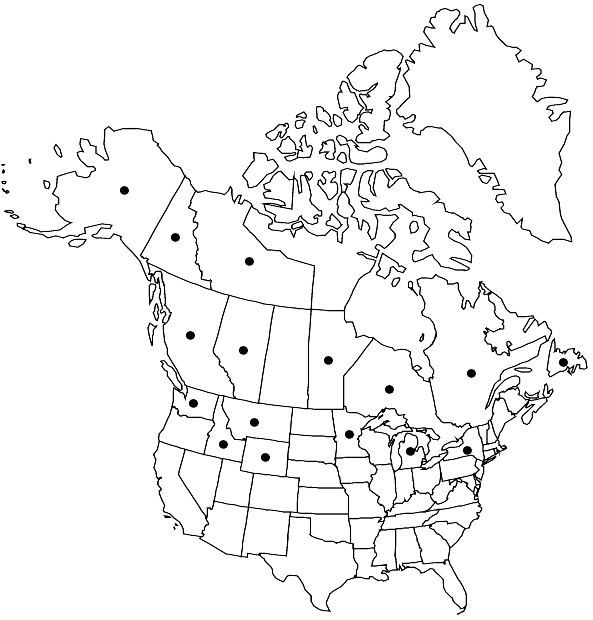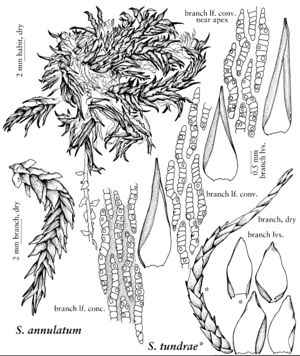Sphagnum annulatum
Bot. Centralbl. 76: 422. 1898,.
Plants moderate-sized and weak-stemmed; in lawns and floating mats; brownish green, brown, reddish brown to chestnut-brown, often with bluish tint when dry, capitulum 5-radiate and flat-topped. Stems pale green to brown; cortex poorly differentiated to undifferentiated. Stem leaves lingulate-triangular to triangular-lingulate, equal to or less than 1.2 mm, more or less spreading; apex obtuse; hyaline cells mostly fibrillose and nonseptate. Branches straight to distinctly curved, leaves becoming substantially longer at distal end of the branch. Branch fascicles with 2 spreading and 1–2 pendent branches. Branch stems green, with cortex enlarged with conspicuous retort cells. Branch leaves ovate-lanceolate, 1.5–2 mm, straight to slightly subsecund, only slightly undulate and recurved if at all; margin entire; hyaline cells on convex surface with numerous small free pores, on concave surface with numerous round free pores, cells relatively short in basal region (similar to mid region); chlorophyllous cells ± triangular in transverse section, just reaching concave surface or slightly enclosed. Sexual condition dioicous. Spores 25–32 µm, finely papillose on both surfaces.
Habitat: Wet carpets, lawns, and mud bottoms in poor to medium fens, in mire-wide and mire-edge habitats
Elevation: low to high elevations
Distribution

Alta., B.C., Man., Nfld. and Labr. (Nfld.), N.W.T., Ont., Que., Yukon, Alaska, Idaho, Mich., Minn., Mont., N.Y., Wash., Wyo., Eurasia.
Discussion
Sporophytes are rare in Sphagnum annulatum. Of the more wet-growing species, both S. cuspidatum and S. viride are typically much more green or yellow and have stem leaves with acute apices. Sphagnum jensenii is usually larger and has straight capitulum branches as opposed to the more curved branches of S. annulatum. Sphagnum majus normally has a denser and more rounded capitulum. Field experience in both Alaska and Scandanavia, where both species occur, does not support the view of H. A. Crum (1997) that S. annulatum and S. jensenii are simply ends of a continuum. Both species are usually readily separable in the field and look quite different in mixed populations. In North America at least S. annulatum is also considerably more widespread.
Selected References
None.
